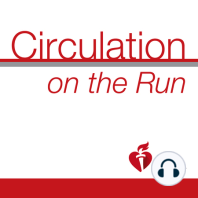18 min listen
Circulation February 25, 2020 Issue
ratings:
Length:
22 minutes
Released:
Feb 24, 2020
Format:
Podcast episode
Description
Dr Carolyn Lam: Welcome to Circulation on the Run, your weekly podcast summary and backstage pass to the journal and its editors. I'm Dr Carolyn Lam, associate editor from the National Heart Center and Duke National University of Singapore. Dr Greg Hundley: And I'm Dr Greg Hundley, director of the Pauley Heart Center at BCU Health in Richmond, Virginia. Dr Carolyn Lam: So Greg, guess what? We are going to be discussing predicting the benefit of evolocumab therapy in patients with atherosclerotic disease using a genetic risk score. That's our featured paper this week coming from the results of the FOURIER trial. I bet you can't wait to discuss it, but I'm not going to let us until we talk about some of the papers in today's issue. Do you have one? Dr Greg Hundley: Yes, Carolyn, but first I'm going to get a cup of coffee because there's a lot of data in this one. This study is from the ODYSSEY trial and it involves alirocumab and it's from Dr Charles Paulding. Remember Carolyn, the ODYSSEY trial was a randomized double-blind placebo-controlled trial comparing alirocumab, a PCSK9 inhibitor or placebo in 18,924 patients with acute coronary syndrome and elevated atherogenic lipoproteins despite optimized statin treatment. And the primary endpoint of this trial comprise death from coronary artery disease, non-fatal MI, ischemic stroke, or unstable angina requiring hospitalization. Now Carolyn, this is a sub-study and it was performed an A genome wide polygenic risk score for coronary artery disease comprising 6,579,025 genetic variants. And they were evaluated in 11,953 patients with available DNA samples. Analysis of the MACE risks, all those outcomes together, was performed in placebo treated patients while treatment benefit analysis was performed across all the patients. Dr Carolyn Lam: Ooh, so what did they find? Dr Greg Hundley: Well, Carolyn, both the absolute and relative reduction of MACE by alirocumab compared to placebo was greater in high versus low PRS patients. Those genetic, polygenetic risk scores combined in the patients. There was an absolute reduction by alirocumab in high versus low PRS groups of 6% and 1.5% respectively, and relative risk reduction in the alirocumab of 37% in the high PRS group versus 13% in the low PRS group. And so Carolyn, these results suggest the possibility of an independent tool for risk stratification using sort of precision medicine by selecting those using these genetic constructs, who may be more likely to benefit from this form of therapy. Dr Carolyn Lam: Wow Greg, that is really interesting. I genuinely think that our world is moving towards precision medicine and this really, really speaks to remember that feature paper also talking about genetic risk scores, but from the FOURIER trial. But before we get to that, I've got a basic science paper. Now this one provides insights into the mechanisms underlying age related hypertension. And it's from Dr Ying Yu and colleagues from Tianjin Medical University who hypothesize that since proinflammatory cytokines increase in T lymphocytes with aging and prostaglandin D2 suppresses T helper 1 cytokines through the D-prostanoid receptor 1, that this axis in T cells may play a role in age related hypertension. Dr Greg Hundley: Ah, Carolyn. What did they find in this study? Dr Carolyn Lam: Prostaglandin D2 biosynthesis and D-prostanoid receptor 1 expression, were both markedly decline in CD4 positive T cells from older humans and aged mice. D-prostanoid receptor 1 depletion in these CD4 positive T cells, exaggerated age dependent blood pressure elevation in mice by increasing tumor necrosis factor alpha and interferon gamma secretion. Whereas its over expression showed the opposite effect and its activation suppressed TH1 cytokines. These results really indicate that D-prostanoid receptor 1 and its downstream pathway may serve as an attractive immuno-therapeutic target for age dependent hyperten
Released:
Feb 24, 2020
Format:
Podcast episode
Titles in the series (100)
Circulation January 23, 2018 Issue by Circulation on the Run
